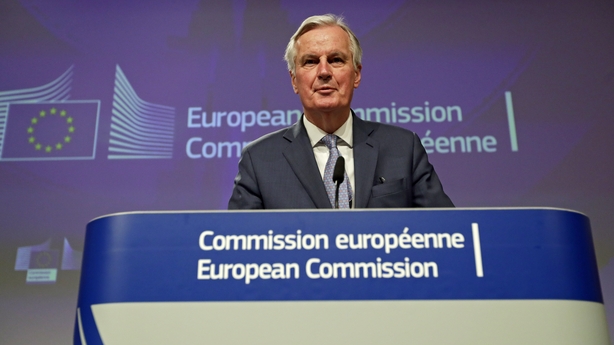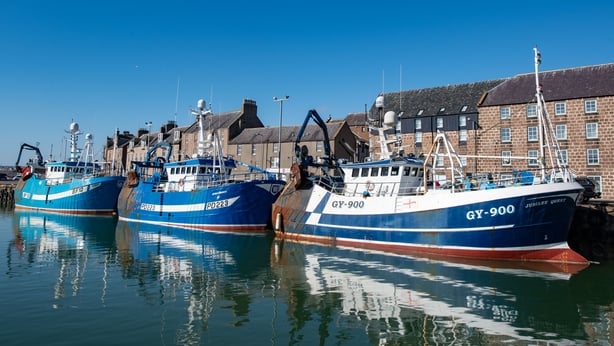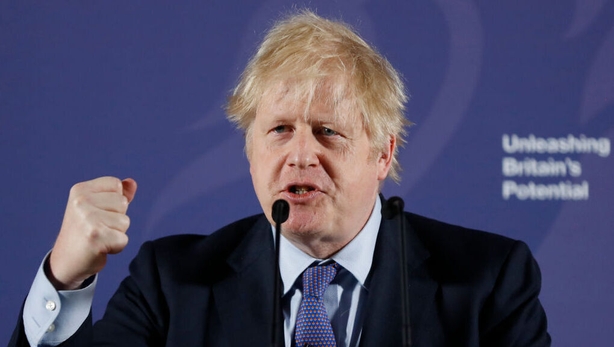The EU's chief Brexit negotiator has issued a veiled warning to the UK that progress on the free trade negotiations will be conditional on London preparing for checks on goods going to Northern Ireland from Britain.
Launching the EU's draft negotiating blueprint for the trade talks in Brussels, Michel Barnier said the EU and UK had to start work "immediately" on implementing the Irish Protocol from the Withdrawal Agreement.
The protocol foresees customs and regulatory formalities for goods between Britain and Northern Ireland once the transition period ends on 31 December.
Asked if progress on the trade talks was conditional on preparing for such controls, Mr Barnier said: "What's going to count is what's going to be done now.
"Cooperation between the UK authorities and ourselves [is needed] immediately, and as time passes, to make sure that the Withdrawal Agreement is made operational in all its aspects, including Ireland and Northern Ireland, by the end of this year."
Mr Barnier added: "I will report regularly and publicly on progress made for these preparations and that will be a sign of confidence and credibility for discussions, of course for the past but also for the future.
"When I look at the Irish Protocol you see a reciprocal commitment on the part of Boris Johnson's government and ourselves to set up checks on goods entering Northern Ireland."
The "negotiating directives" will now be studied by member states, who are then expected to formally adopt them on 25 February.
The negotiations will then begin in early March.

Mr Barnier made it clear that the EU would demand so-called "level playing field" guarantees if the UK wanted zero tariff and zero quota access to the EU's single market.
"Goods entering the union will be subject to regulatory checks. These are automatic, and if I may say, mechanical consequences of the UK's choices. Businesses must adapt now to this new reality," he said.
"Of course where our rules converge, either where the UK chooses to match our standards or, for example where activities are subject to international regulations that we share, it will be easier for business to exchange on both sides of the channel.
"The more we have common standards, the higher quality access the EU will be able to offer to its markets.
"But this will be up to the UK to decide. Will it continue to adhere to Europe's societal and regulatory model in the future, or will it seek to diverge? The UK's answer to this question a key question will be fundamental for the level of ambition of our future relationship. And the UK must know this."
He also insisted that progress on a free trade agreement would be conditional on EU fleets gaining "reciprocal" access to UK fishing waters.
He said: "It's clear that the agreement that we wish to have in the interests of UK fishermen and in the interests of European fishermen, I call that reciprocal access to our territorial waters and our markets, that agreement on fisheries will inextricably linked to the trade agreement."

Mr Barnier said the future relationship would be about more than trade, and as such there would be areas where the European Court of Justice would be the final arbiter.
Singling out the EU's policies on internal security (police and criminal cooperation, the fight against terrorism), Mr Barnier said that cooperation in this sphere would involve arrest warrants and the potential sharing of data on the DNA of European citizens.
He told a news conference: "This has to be done in line with European law. That's what we have in mind for the long term. It's for the ECJ to rule on European law."
Read more:
UK expects EU to offer Canada-style trade deal - Raab
Johnson reportedly planning full customs checks from 2021
Brexit is done: Now for the hard part
Meanwhile, British Prime Minister Boris Johnson has said that Britain does not accept the EU's rules to strike a comprehensive free trade deal with the bloc.

In a speech to ambassadors and business people in London, he said that the choice was either a Canada or Australia-style accord.
"There is no need for a free trade agreement to involve accepting EU rules on competition policy, subsidies, social protection, the environment or anything similar, any more than the EU should be obliged to accept UK rules," he said.
"Are we going to insist that the EU does everything that we do as the price of free trade? Are we? Of course not.
"We want a comprehensive free trade agreement similar to Canada's but in the unlikely event that we do not succeed then our trade will have to be based on our existing withdrawal agreement with the EU.
"Let's be clear the choice is emphatically not deal or no deal, we have a deal."
Just three days after Brexit day, both sides are now squaring up for what could be bruising trade negotiations.
Downing Street has adopted a notably aggressive tone since Friday, accusing the EU of reneging on commitments both sides have already made on the future relationship.
We need your consent to load this rte-player contentWe use rte-player to manage extra content that can set cookies on your device and collect data about your activity. Please review their details and accept them to load the content.Manage Preferences







